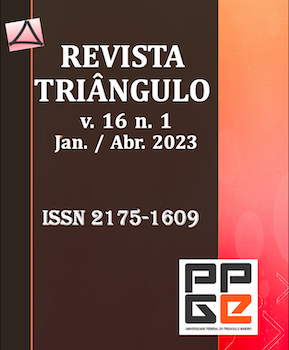Spiritual science and goethianistic anthroposophical thought:
a decolonial and emancipatory knowledge
DOI:
https://doi.org/10.18554/rt.v16i1.6544Keywords:
Spiritual Science, Anthroposophical Philosophy, Decolonization, Rudolf Steiner.Abstract
In this work, our objective is to demonstrate that the thinking of the philosopher Rudolf Steiner can be used, due to his methodological principles, as powerful instruments for the resistance of the sacred territories, against the political-scientific colonization, whose premises are based on materialistic and disenchanted aspects. . Thus, starting from Catharine Walsh's decolonial understanding, our argument consists in defending that the methodological perspective of Goetheanistic anthroposophy allows the researcher and educator to be constantly open to the living phenomena that present themselves, in order to reach what it is essential in your relationship with the experienced world. It was concluded that spiritual science from the methodological perspective of Anthroposophy becomes an important tool for the search for human emancipation, based on the understanding that spiritual science is itself a practical dimension and that it should enable effective transformation of reality, considering it as part of other knowledge neglected by materialist-disenchanted thinking.
References
BACH JUNIOR, Jonas. Fenomenologia de Goethe e Educação: a filosofia da educação de Steiner. Curitiba: Lohengrin, 2019.
STEINER, Rudolf. A obra científica de Goethe. (GA 01) Trad. Rudolf Lanz, São Paulo: Antroposófica, 1984.
STEINER. Verdade e Ciência: prelúdio a uma “Filosofia da Liberdade”. (GA 03). Trad. Rudolf Lanz. São Paulo: Antroposófica, 1985.
STEINER. Teosofia: introdução ao conhecimento suprassensível do mundo e do destino humano. Trad. Daniel Brilhante de Brito. 4. ed.
São Paulo: Antroposófica, 1994
STEINER. A prática pedagógica: segundo o conhecimento científico-espiritual do homem. Trad. Christa Glass. São Paulo: Antroposófica: Federação das Escolas Waldorf no Brasil (FEWB), 2000.
STEINER. O método cognitivo de Goethe: linhas básicas para uma gnosiologia da cosmovisão goetheana. 2ª Ed (GA 02). Trad. Bruno Callegaro, Jacira Cardoso. São Paulo: Antroposófica, 2008.
STEINER. Goethe y su visión del mundo. (GA 06) Trad. Julia Hernandez Sans y Rafael Martín Artajo. Villa Adelina: Antroposófica, 2011.
STEINER. Os Pontos Centrais da Questão Social: aspectos econômicas político-jurídicos e espirituais da vida em sociedade. São Paulo: Antroposófica, 2011b.
STEINER. Los enigmas de la filosofia: evolución del pensamento a través de la história. Buenos Aires: Antroposófica, 2012.
STEINER. A arte de educar baseada na compreensão do ser humano. Trad. Maria do Carmo Lauretti. São Paulo: Antroposófica: Federação das Escolas Waldorf no Brasil (FEWB), 2013.
STEINER. A Cultura atural e a educação Waldorf: catorze palestras proferidas em Ilkley de 5 a 17 de agosto de 1923. Trad. Eleonore Pllklaesner, Sergio Correa, Jacira Cardoso. São Paulo: Antroposófica: Federação das Escolas Waldorf no Brasil (FEWB), 2014.
STEINER. O estudo geral do homem: uma base para a pedagógica. Trad. Rudolf Lanz, Jacira Cardoso. 6ª Ed. São Paulo: Antroposófica, 2018.
STEINER. Três palestras sobre Pedagogia Popular: nova orientação do ensino no sentido de uma vida espiritual livre. Trad. Carlos Lira. Edição bilíngue. São Paulo: Hífen Editora e Círculo das Artes, 2020
WALSH, Catherine. Interculturalidad, Estado, Sociedad: luchas (de)coloniales de nuestra época. Quito: Universidad Andina Simón Bolívar/Abya Yala, 2009
Downloads
Published
How to Cite
Issue
Section
License
Copyright (c) 2023 JOURNAL TRIANGLE

This work is licensed under a Creative Commons Attribution-NoDerivatives 4.0 International License.
Autores que publicam nesta revista concordam com os seguintes termos: Autores mantém os direitos autorais e concedem à revista o direito de primeira publicação, com o trabalho simultaneamente licenciado sob a Licença Creative Commons Attribution que permite o compartilhamento do trabalho com reconhecimento da autoria e publicação inicial nesta revista.




